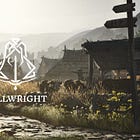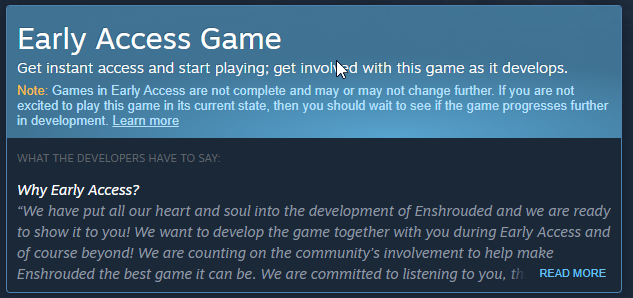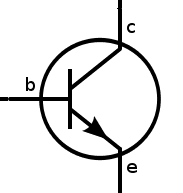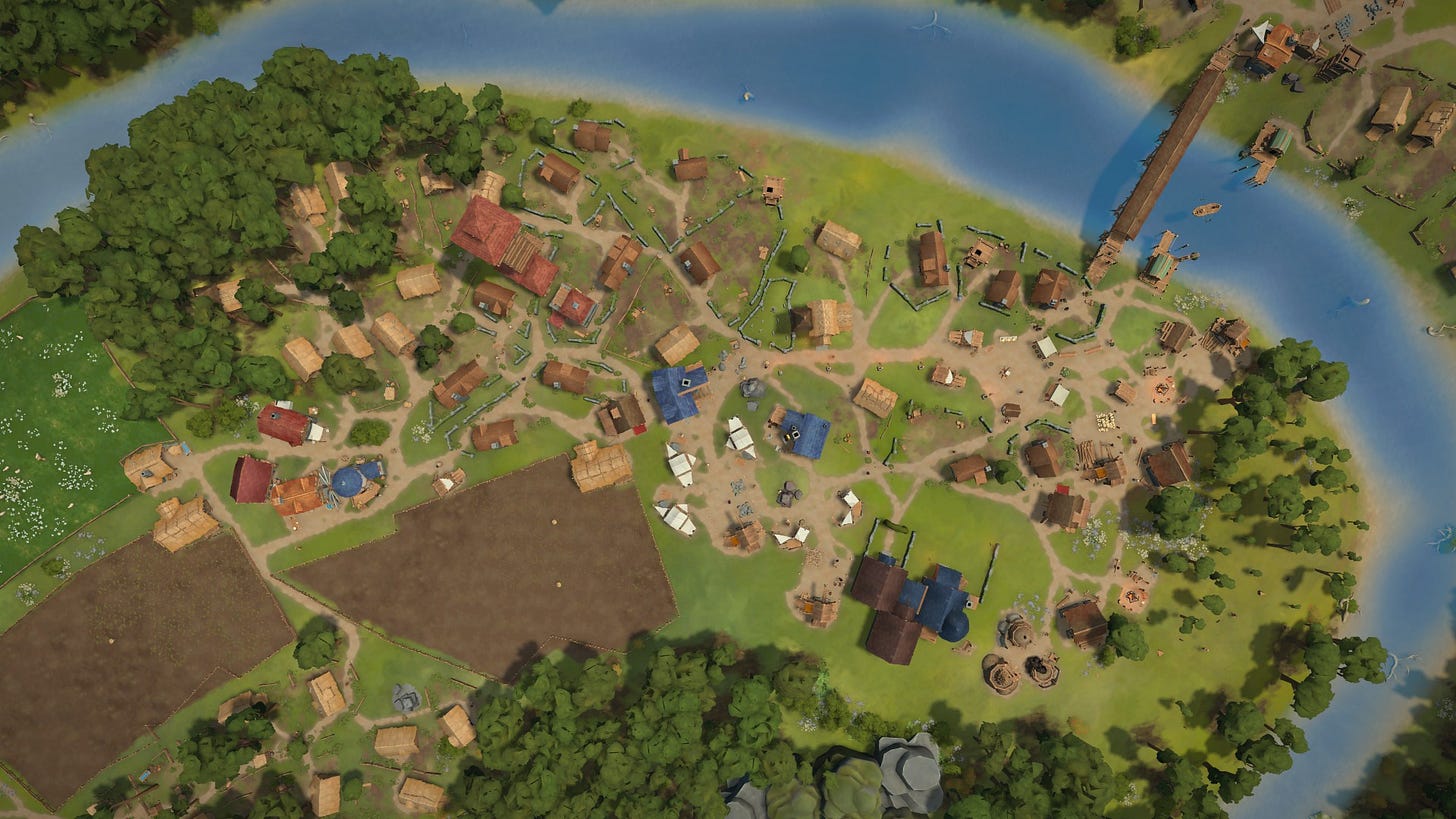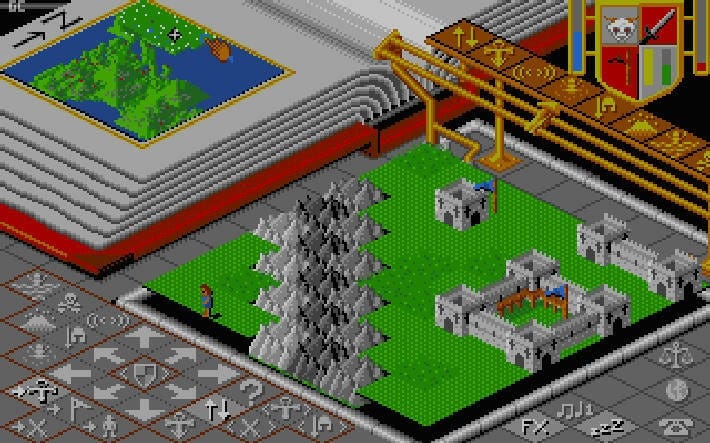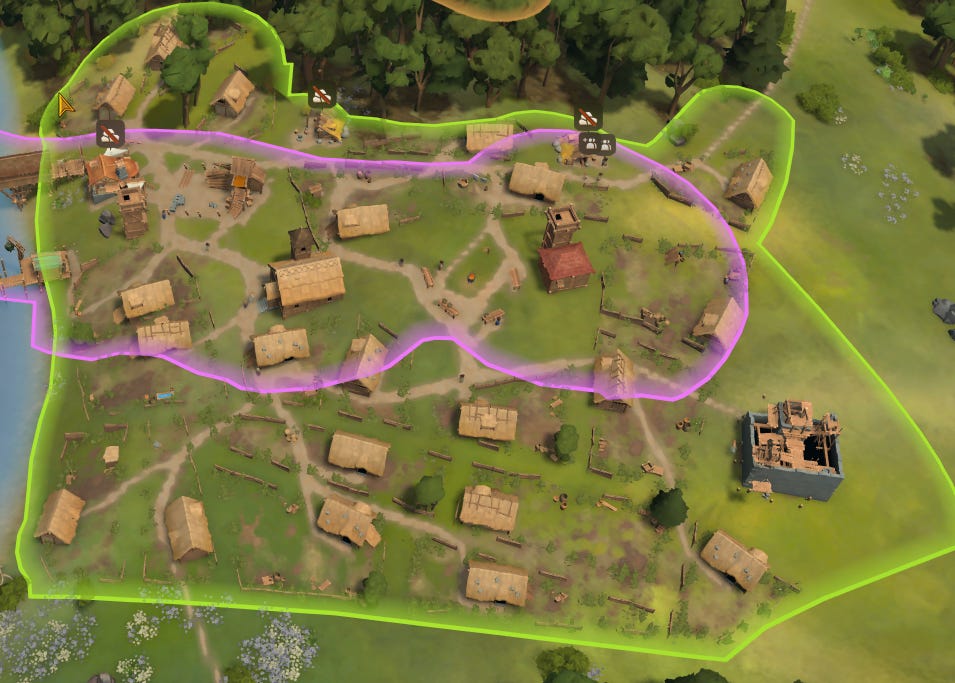Foundation is a Fantastic and Chill City Builder
Review of Foundation after it's 1.0 release
Thank you to all the support from my family, friends, and everyone who has subscribed over these last couple weeks.
Top Referrers
None Yet
Refer your friends and show up on the Referral Leaderboards at the top of each post!
Introduction
I’ve been addicted to city building games as of late. See my other recent articles:
Therefore It’s my duty as an energy vampire to talk about another City-Building game.
Fortunately for all of you I’m not made of money. Unless all those publishers I reached out to decide to get back to me with game keys, I’m going to have to get a little more creative.
Reaching out to PR contacts has been nearly as successful as applying for jobs 😭
I take that back. After writing this I actually got an acceptance email from SEGA. So that’s cool!
What is Foundation?
Foundation is a medieval city building game from Polymorph Games who’s other games include … nothing. This is their only game.
Foundation has been in early access for 3 years and finally hit it’s 1.0 release.
What does early access, and 1.0 mean?
I have a lot of family reading this [hi! Love you all!] who aren’t tied to the internet and games 24/7. All that sunshine and fresh air prevents them from knowing their definitions thus preventing them from reaching true nirvana.
Clearly Ghandi was born in the wrong century.
Early access is a term that means you can buy a game before it’s finished. You have the privilege of giving the developers feedback as they actively change the game.
Its like paying up front for a sandwich from subway, but getting to take a bite after every new ingredient.
The catch is that not every sandwich makes it to the register. So you could get halfway through a sandwich and the employee just decides to throw it out. You’ve paid up front so you’re just expected to leave.
Which is why It’s an achievement for a game to reach 1.0 in a way that people feel like their sandwich didn’t just stay as two slices of bread the whole time.
1.0 is the state a game reaches when the developers deem the project as “complete.”
Basically the point when the sandwich is wrapped for you to take.
This is because developers really like numbers, and their two favorite numbers are 1 and 0.
What Makes Foundation Unique?
We seem to find ourselves in the middle of a city builder golden age. I could make a “Find Your Own City Builder App.”
You’d just enter what features you want and a game would pop out that has all those features.
Foundation provides the ultra niche experience of dark ages ant colony where the roads build themselves. The big selling point for Foundation is that the game does not take place on a grid. Instead you can rotate and place your buildings wherever you want and your villagers just figure out the best way to get there.
The experience is far more chill than something like Bellwright, or its distant grandparent Banished.
I played the demo for the game which overwhelmed me with it’s chillness. I bounced off the demo immediately and decided it wasn’t for me. The game however, had sown its seeds. The next day… I wanted to play more.
The gridless building system is not the only thing that makes Foundation unique.
Foundation’s Building System
Foundation also employs a building system similar to…
Ok this is a throwback, but the first thing it reminded me of is the building system in Spore.
I suppose it’s closest relative nowadays is Tiny Glade. Tiny Glade is utterly beautiful, and is a game about building castles. However, Tiny Glade is an art game, and has no strategy or simulation in it.
Foundation takes that system and asks. What if we added economy, villager happiness (like that in Anno), and some light combat.
To which I say,
This system also ties into the upgrades which require you to meet certain requirements in either Trade, Military, or Religion. I think this system from a design standpoint is smart. It ties many of the systems together.
My personal standpoint is mixed. I don’t always want to sit down and design a new building. I wish there were presets I could choose from if I’m feeling too lazy to build my own.
Economic Simulation
One of the aspects of the game I really enjoy is the games economic simulation and zoning.
City building games, by their nature, have a very clear and visual representation of the flow of resources through your system.
You put down the woodcutter, you hired the workers. I’ve always liked this kind of simulation.
My issue with this game’s system is that balancing production lines is very difficult. It’s standard in city building games with production lines to have some way to track what each building is producing and how much it uses.
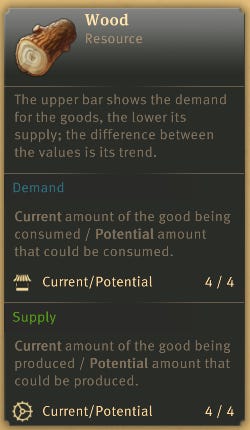
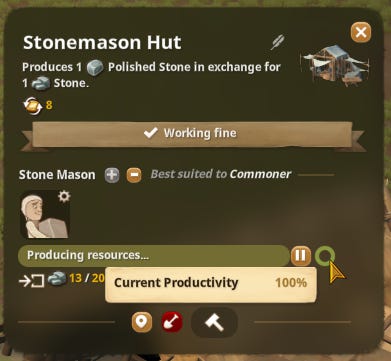
Notice in the screenshot on the left it shows you how much you are producing vs how much you are using. In Foundation no such screen exists.
You want to know this so you’re not wasting workers time while waiting for resources somewhere on the line.
Unfortunately there’s no way to track these metrics (as far as I know). You just have to, like, vibe it out man.
There is, however, another economic system that makes me want to pull my hair out from time to time. The town trading system.
Trading can be used as an additional revenue source, but early game it acts as a life vest for high tier resources. You have no way of crafting them, and you will run out.
The issue with this system is that traders come by infrequently. Even on the fastest speed it feels like they come around every 10 or 15 minutes. If I’m short on tools my whole town grinds to a halt until they show up.
Of course this is a new player problem. In the future I’ll know to stock up on more, but my goodness it’s frustrating.
God Game Influences
Earlier in the article I said that we are in a golden age for City Building games. There is another genre that Foundation takes inspiration from. This genre is clearly not the favorite child. The god game genre.
Started by the game Populous released in 1989 by Bullfrog Productions. This genre is largely about influencing your civilization through acts of god. The people will do what they want. You are simply their deity, granting their wishes and smiting your enemies.
This genre was shelved years ago. Though small attempts to revive it have shown up here or there. Most notably the Xbox Live Arcade Game From Dust which I adored. From Dust had similar vibes, but it was more of a puzzle game than strategy.
I compare to this genre because, although you place some buildings. You don’t place all of them. The zoning feature, which is reminiscent of the zoning system in games like SimCity or Cities Skylines, satisfies this god game callback.
On the landscape you paint a residential zone with a brush and they decide when and where to build them in this zone. Since the AI is in charge of it’s own pathing, roads naturally appear on the routes villages take the most.
I think this system is so cool.
Conclusion?
I really like Foundation for it’s interesting mash up of genres. It’s very chill. While I think the chill vibes won’t suit all types of city building players, if you are someone who likes games with AI simulations, or god games, this game is a good time.
I write a new article every week!
I also live-stream myself writing my reviews over on Twitch. Stop by and say, “Hi!”
Don’t forget to follow me on my social media down below.
And I think you’ll like last weeks article:
Featured Twitch Viewers
SparklyShiny
Check Out Nick’s: Bluesky | Steam Curator | Writing Livestream
Chat with the writers themselves on the Bits N’ Pixels Discord Server!
Foundation city-building game gridless medieval simulation Early Access 1.0 review Polymorph Games medieval economy god game influences Spore Tiny Glade comparison Anno-inspired happiness zoning system chill city builder resource management Banished successor Populous vibes From Dust spiritual successor economic simulation flaws




